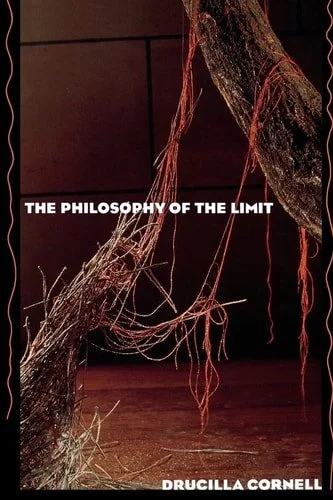 Image 1 of 1
Image 1 of 1


The Philosophy of the Limit by Drucilla Cornell; Professor of Political Science Women's and Gender Studies and Comparative Literature Drucilla Cornell
$46.95
Sold Out
In The Philosophy of the Limit Drucilla Cornell examines the relationship of deconstruction to questions of ethics, justice, and legal interpretation. She argues that renaming deconstruction "the philosophy of the limit" will allow us to be more precise about what deconstruction actually is philosophically and hence to articulate more clearly its significance for law. Cornell explores the ethical and juridical significance of the so-called postmodern rebellion against metaphysics. A shared ethical rebellion links philosophers as different as Theodor Adorno, Jacques Derrida, Jacques Lacan, and Emmanuel Levinas. Together they present a new ethical configuration, new in its difference from both the critical social theory of Jurgen Habermas and the analytic jurisprudence of Nagel and Rawls. A key aspect of this newness is the centrality given to the relationship between questions of ethics and sexual difference. Cornell argues that the appeal of Lacan's analysis to feminists is that it helps to explain the profound hold the gender hierarchy has over Western culture, including its theories of political transformation. Cornell examines Derrida's position on the significance of the gender hierarchy in philosophy and explores its ethical and political importance. Derrida's intervention against legal positivism has important implications for the legal reforms necessary to protect marginalized groups. His emphasis on the limit, she argues, is crucial to those whose well-being and very lives may depend on legal transformation, women and homosexuals, for example. Cornell's focus on the importance of the limit and the centrality of the gender hierarchy allows her to offer a view of jurisprudence different from both critical social theory and analytic jurisprudence. In 1992, as we watch the long-fought-for civil rights of women systematically overturned, we have reason to think about how the connections she makes shed light on an underlying truth of our social, political, and legal reality.
Edition Details
ISBN:
0415902398
Publisher: Routledge
Format: Paperback
Publication Date: 1992
Publisher: Routledge
Format: Paperback
Publication Date: 1992
In The Philosophy of the Limit Drucilla Cornell examines the relationship of deconstruction to questions of ethics, justice, and legal interpretation. She argues that renaming deconstruction "the philosophy of the limit" will allow us to be more precise about what deconstruction actually is philosophically and hence to articulate more clearly its significance for law. Cornell explores the ethical and juridical significance of the so-called postmodern rebellion against metaphysics. A shared ethical rebellion links philosophers as different as Theodor Adorno, Jacques Derrida, Jacques Lacan, and Emmanuel Levinas. Together they present a new ethical configuration, new in its difference from both the critical social theory of Jurgen Habermas and the analytic jurisprudence of Nagel and Rawls. A key aspect of this newness is the centrality given to the relationship between questions of ethics and sexual difference. Cornell argues that the appeal of Lacan's analysis to feminists is that it helps to explain the profound hold the gender hierarchy has over Western culture, including its theories of political transformation. Cornell examines Derrida's position on the significance of the gender hierarchy in philosophy and explores its ethical and political importance. Derrida's intervention against legal positivism has important implications for the legal reforms necessary to protect marginalized groups. His emphasis on the limit, she argues, is crucial to those whose well-being and very lives may depend on legal transformation, women and homosexuals, for example. Cornell's focus on the importance of the limit and the centrality of the gender hierarchy allows her to offer a view of jurisprudence different from both critical social theory and analytic jurisprudence. In 1992, as we watch the long-fought-for civil rights of women systematically overturned, we have reason to think about how the connections she makes shed light on an underlying truth of our social, political, and legal reality.
Edition Details
ISBN:
0415902398
Publisher: Routledge
Format: Paperback
Publication Date: 1992
Publisher: Routledge
Format: Paperback
Publication Date: 1992
